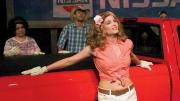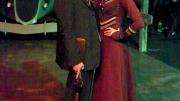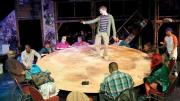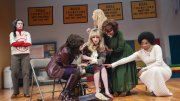Scott Miller ’86 dreams of producing an absurdist musical called Promenade. The author, Maria Irene Fornés, recorded a series of nouns on index cards and then randomly selected from the stack to write each scene. “It’s so bizarre,” he says, grinning and leaning back against the show posters that line the walls of his home office. “Honestly, I’m terrified that no one would actually come to the show.” The prospect of a theater devoid of patrons doesn’t dull Miller’s smile. The self-described “bad boy of musical theater” has earned a following in his hometown, St. Louis. And New Line Theatre, the nonprofit company he founded, recently celebrated its twenty-fifth anniversary and moved into its first permanent home.
Miller began his career as a teenage usher at what was then the city’s only professional musical-theater company. For eight consecutive summers, he guided patrons to their seats and listened to family-friendly productions of Oklahoma! and Fiddler on the Roof. Itching to tackle “more challenging, adult stuff,” he arrived at Harvard ready to start a concentration in musical theater, only to learnthere wasn’t one. “It didn’t even occur to me to ask,” he says. He briefly considered transferring before learning that the College would fund student productions. Then he proceeded to stage what he calls “guerilla theater” in common rooms, libraries, and wherever else he could find space. “Because there was no theater department, there was no control,” he says. “It was wild and really cool.”
After graduation, Miller opted against a move to New York, electing instead to launch his career away from the entrenched norms of Broadway. Partly because costs were lower, St. Louis was a “safe space” for the kinds of rule-breaking productions he wanted to stage. “If it’s bad,” he says, “it’s bad in St. Louis.” He founded New Line in 1991. The early years were challenging. Making money by writing and directing edgy theater in small venues across the city was almost impossible, but Miller became skilled in the financial acrobatics necessary to keep the company afloat: “We figured out we could do one show that might tank, like Jerry Springer: The Opera, and then something that was more secure financially, like Bonnie and Clyde.”
“We’ve accidentally become this company that saves shows from Broadway,” he says.
Beginning in 2008, the company earned national attention for reviving Broadway flops. Miller became infatuated with the cast album for a new show called High Fidelity, adapted from Nick Hornby’s novel. Curious to find out why it tanked on Broadway after just 13 performances, Miller dug up a bootleg video of the production, concluded that the “original director was just awful,” and reached out to the composer and lyricist about getting the rights. They were surprised but thrilled that he wanted to resuscitate their show.
High Fidelity made its second debut in a raucous, pared-down production that sold out almost every night of its three-and-a-half-week run. Following that hit, New Line revamped two more shows with short-lived Broadway runs: Cry-Baby, adapted from the John Waters film, in 2012, and Hands on a Hardbody, about a Texas contest in which participants vie to win a truck, in 2014. Each of the re-crafted productions drew enough attention that directors all over the country began seeking his advice. “We’ve accidentally become this company that saves shows from Broadway,” he says.
In the theater world, Miller’s faithfulness to scripts is uncommon.Many directors cut chunks from shows—even from hits—to save time and hassle, or to broaden appeal. New Line’s associate director, Mike Dowdy, says he’s never seen Miller cut a line from a production. When something feels wrong, Miller scavenges for past versions of scripts, tracks down writers and lyricists, and scours the Internet for anything that helps provide useful context. He relied on the memoir of an addict in early 1990s New York City to shape his interpretation of Rent. For Hair, which New Line has produced several times, he scrounged up a first-person account of an LSD experience to help his actors bring the psychedelic scenes to life. As Miller does more research, “he gets more and more excited, and that fuels us,” Dowdy says. “He’s really about creating a world for the actors to live in.”
Miller’s production choices strategically highlight each story’s social relevance. His version of Rent offers one example. For the set’s focal point, he requested a vast round platform painted to look like the moon. The platform represented everything from a table to a dance floor to a state of limbo for characters forced to navigate lives shattered by addiction and disease. He also cast unusually young actors, judging that the show’s wrenching narrative was much sadder that way.
According to Miller, shows like Rent, which debuted in 1996,are part of a new age of musical theater created by writers and lyricists who spurn commercial norms and turn instead to productions focused on social and political issues. “People were writing these shows that felt like old-school musicals, but with new dark, ironic content,” he says. “It was happening all around the country, but all the little pieces didn’t know about each other.”
New Line started as one of those pieces, a radical Midwestern theater lonely in its mission. But after two-plus decades operating out of church basements and college theaters, it finally has a permanent brick-and-mortar home. The Marcelle Theater is tucked inside a renovated warehouse on a gentrified street in the city center. Designed especially for New Line thanks to local philanthropists Ken and Nancy Kranzberg, the facility holds a black-box theater, rehearsal space, studios, and offices. New Line inaugurated the space in November with its sold-out production of Heathers. Next up is American Idiot, opening in March.
As for his dream production of Promenade? Well, Miller says, “We’ll do that one when we have $20,000 in the bank.”














